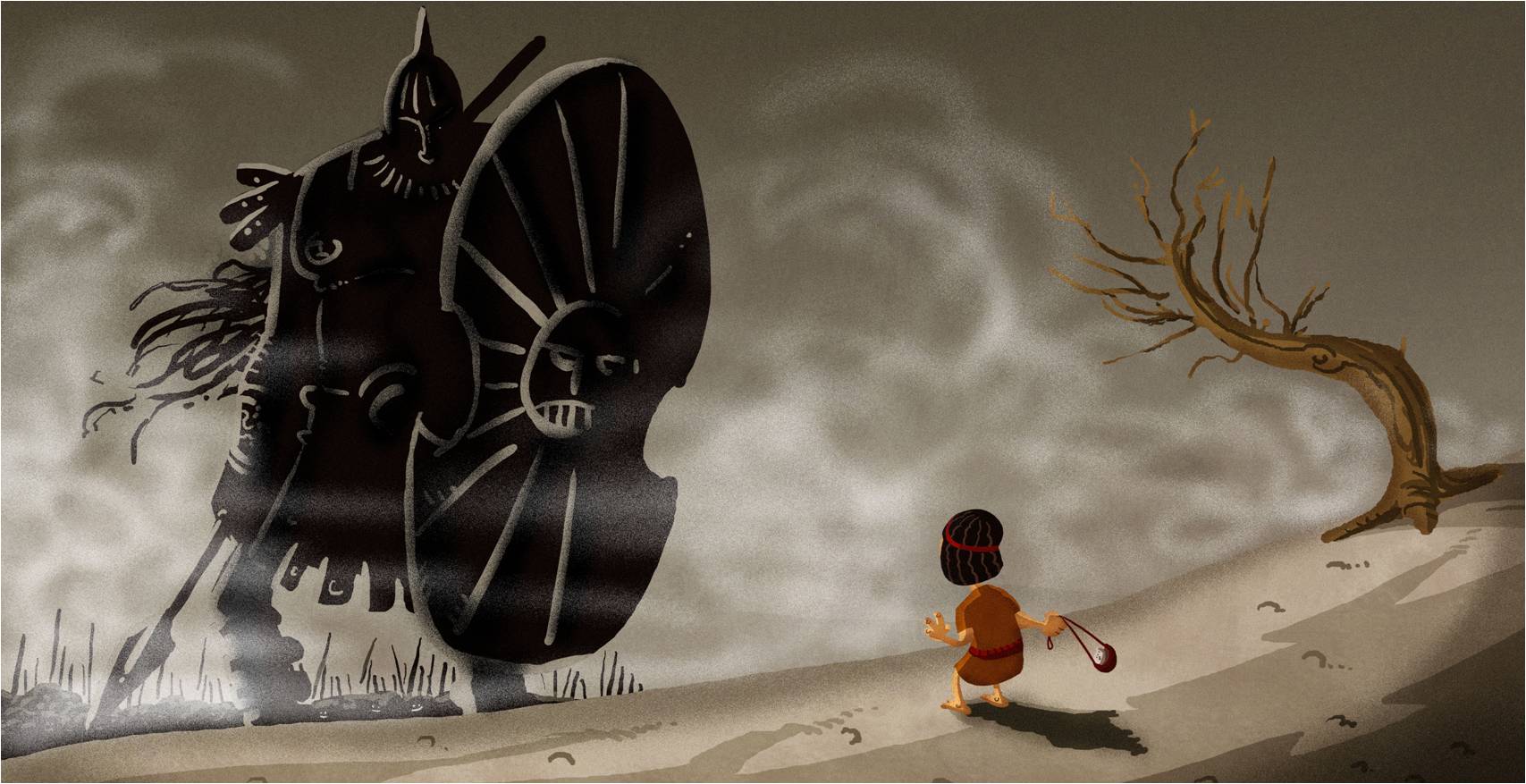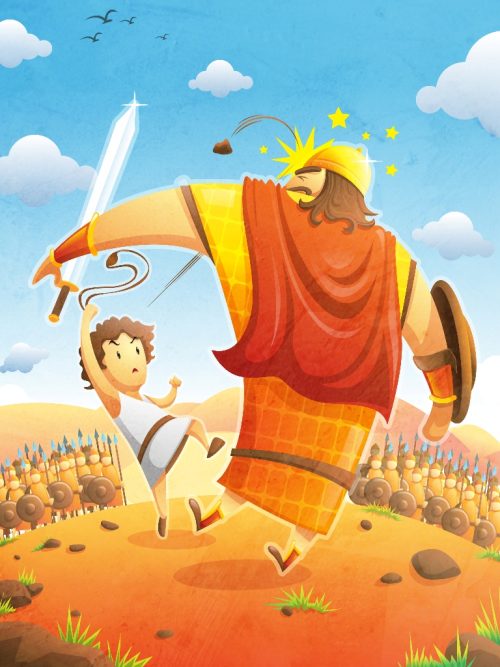
DAVID: A MAN LOYAL TO GOD -The stone is the cross, and the wound on Goliath’s forehead is the serpent’s head finally crushed “If God allows a Goliath in front of you, then He knows there is a David inside of you.” The only way to be liked by the world is to deny Christ.
The stone is the cross, and the wound on Goliath’s forehead is the serpent’s head finally crushed “If God allows a Goliath in front of you, then He knows there is a David inside of you.”
God fortified David against the offspring of The serpent “Goliath” symbolizing Man crushing the serpent’s head. This was also a foreshadow of The Messiah doing this once and for all by being crucified over the same place that david buried the head of Goliath and is symbolised in this process within us.
First, a man who is loyal to God understands God’s power. David didn’t challenge the giant Go-liath to prove his own toughness; he did it to prove God’s strength. He came upon a scene in which no one else among God’s people seemed to grasp who was backing them.
The only way to be liked by the world is to deny Christ.
David went against Goliath without carnal weapons. David did not think for a moment that he was fighting Goliath. He always knew Goliath was fighting God. Goliath was not only the physical manifestation of the man who stood in front of David that day. Goliath represents anything that stands against the move of God and tries to stop it through fear and intimidation.
If you want to know the reason for these attacks, they are acts of retaliation. The enemy knows he’s losing ground, so he is calling in reinforcements, hoping to crush us in our moments of pressure, grief, worry, and weakness. But we will not stay there because we know how to get out of the place of pressure and grief.
If you want God, you’ll have Him because we are under an open heaven, we are in a season of habitation, and we are in a season of visitation and it’s available to everyone. The enemy can’t kill that, but he will try to carry it away captive. And as David and his men did, we weep over what we lost until we can’t weep anymore. But then something shifts.
The David and Goliath story is the one story about defeating giants that is common knowledge both in and out of the Church.
If we want our children to defeat Goliath´s, we must face and destroy our own giants. Our example and momentum will become their inheritance.
1 Samuel -2 Chronicles
David and Goliath In the story of David versus Goliath, we are previewing the promised king who triumphs while all the odds seem stacked against him. Young David takes on the enemies of God, and their representative is Goliath (1 Sam. 17:4).
The motif of God’s enemies takes us beyond Goliath to Satan and his demonic host. The stone is the cross, and the wound on Goliath’s forehead is the serpent’s head finally crushed (Gen. 3:15; 1 Sam. 17:49).
When read within the whole canon, the victory of David over Goliath has messianic tones for those with ears to hear.3 And in our union with Christ, the victory of David is ours as well. Through the strength of Christ, we overcome temptations and perse-vere through trials.4 If God is for us, who can be against us?
“David Beats Goliath Again.” While these are accurate uses of the story in measure, the actual record of the David and Goliath conflict is so much greater. First of all, I remind you, David was a young shepherd boy who stood up in spite of Israel’s history of fearing giants.
A child born out of wedlock is a physical reminder that only in God’s economy can life come out of sin. As the Great Redeemer, God is good at treasuring what people reject.
Regardless of his beginnings, David grew up against the odds and became significant through the sovereign touch of God on his life. When David went up against Goliath, he was confronting Israel’s own history.
The fear of giants is what kept them from the Promised Land in the first place. And now a young man shows nothing but contempt for this giant who taunts the armies of the living God. This attitude is something you cannot fake. David felt disgust for this one who was now blaspheming the name of the Lord. When you walk with God as David did, feeling jealous for His name is normal and healthy.
“If God allows a Goliath in front of you, then He knows there is a David inside of you.”
The David and Goliath story is the one story about defeating giants that is common knowledge both in and out of the Church.
If we want our children to defeat Goliath´s, we must face and destroy our own giants. Our example and momentum will become their inheritance.
The Story of Job
The deepest meaning of Job’s story is the story of Jesus. The account of Job—a man who suffered the loss of family and animals and who faced the ridicule and accusations of his “friends” (Job 1-3)—is part of a larger story taking us to the righteous sufferer, the Lord Jesus, who faced betrayal and suf-fering and death.
The story about Job also reminds us that those who fear the Lord can face unjust suffering at the hands of others. In the hardness of life, believers may find themselves in a darkness and despair where the book of Job takes on fresh significance.
Job is Jesus, and Job is us.
We see in his story the agenda of Satan against us, and we read the false accusations of those who think they know our motives and why things happen to us.
But Job’s story tells us that God has the last word (Job 38-41).
His power can bring vindication and renewal, despite the suffering and the heartache his people experience (Job 42).1 Leviathan seemed an untamable adversary, but God is supreme over this creature (Job 41).
Leviathan is Satan, the one who opposed Job at the beginning of the book (Job 1-2), but also the one whose every move is under the eye of our sovereign God. No man can tame Leviathan, but God can.
Goliath’s pride is another possible link with the serpent because of Job 41:26 (ET v. 34). This verse states that Leviathan “sees everything that is high (7121); he is king over all the sons of pride.”
We have already seen in the previous chapter that texts like Isa 27:1 link Leviathan with the serpent from Gen 3:15. Also, Pharaoh, who speaks as a sea monster in Ezek 29:3, pridefully uses the first person singular as Goliath does. Leviathan, Pharaoh as a sea monster, and Goliath all represent pride.
We have already seen in the previous chapter that texts like Isa 27:1 link Leviathan with the serpent from Gen 3:15. Also, Pharaoh, who speaks as a sea monster in Ezek 29:3, pridefully uses the first person singular as Goliath does. Leviathan, Pharaoh as a sea monster, and Goliath all represent pride.












